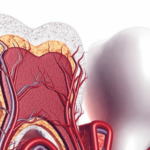
A root canal treatment is a procedure used to repair and save a tooth that is badly decayed or infected. If the pulp (the soft tissue inside the tooth that contains nerves and blood vessels) becomes infected or damaged, it can cause a lot of pain and lead to an abscess (a pocket of pus) if left untreated. While root canal treatment can be a little intimidating, it is actually a common and relatively simple procedure that can help relieve pain and save your tooth.
There are 5 techniques to determine whether you need a root canal.
Repairing a decayed or infected tooth is an effective way to prevent infection and discomfort in your teeth.
A root canal is a specialized dental procedure that cleans out abscesses, pulp, and germs from inside your tooth.
We invite you to make an appointment for a consultation at your Dentaverse Clinic if you think you might require a root canal or are considering other dental procedures to see which one would best meet your needs.
Which symptoms indicate a necessity for a root canal?
How can you tell if the pain you’re experiencing indicates that you require a root canal procedure? These five indicators may point to the need for a root canal.
1. Persistent tooth pain
Any toothache is a sign that there is a problem.
Tooth pain is among the most frequent causes of root canals.
Bacteria and decay may have gotten into the pulp of your tooth, which can lead to abscesses and infection.
This damages the tooth’s nerves, which can cause swelling and excruciating pain in your jaw.
You might require a root canal from a dentist or tooth removal depending on the severity of the damage.
2. Tooth sensitivity
Do you get tooth pain whenever you consume hot or cold liquids?
You might notice that your tooth sensitivity worsens when you chew, clean, or put pressure on your teeth.
Damaged nerves or a bacterial infection in your teeth and gums can cause tooth sensitivity.
What occurs if a root canal is not attended to?
If the need for a root canal is neglected, the bacterial infection may extend to the gums and jaw, among other regions of the mouth.
It may also result in a tooth abscess, a pus-like infection that may cause several grave health problems.
A root canal eliminates your pain by addressing the underlying problem in your dental pulp.
3. Swollen gums
Swollen or sore gums are a common occurrence, and they might indicate a variety of dental health issues.
However, in other instances, the presence of swollen, painful, or discolored gums could be a symptom that a tooth infection is causing gum disease.
You might need a root canal in such circumstances.
Swollen and uncomfortable gums are a definite sign that something is amiss, regardless of the source. Consult with our dentist right away if you can’t stand the agony.
4. Tooth discoloration
The discoloration is most often caused by food and lifestyle factors, such as drinking coffee and smoking.
However, tooth discoloration can also be an indication of tooth decay and a subsequent root canal may be required if a tooth continues to discolor or decay.
A tooth infection in your pulp can also cause sudden discoloration, leaving a tooth black or grey in appearance.
5. Broken teeth
Have you recently suffered from a broken, chipped, or fractured tooth? Avoid enduring the agony because doing so can harm your nerves and cause an infection or inflammation.
Exposure to bacteria from broken teeth increases the risk of infection, which over time could harm the nerves in your teeth. When this occurs, the pulp in your tooth may require treatment with a root canal.
How can I avoid a root canal?
The best and most efficient treatment for a tooth that is infected is frequently a root canal. While there’s no assurance you’ll never need a root canal, maintaining good oral health is essential for keeping your teeth in great shape.
These basic yet essential steps consist of:
- Every day, brush and floss
- Avoid acidic beverages and hard meals.
- When playing sports, use a mouthguard.
- You should only use your teeth to chew food.
- Don’t disregard discomfort or pain
- Plan frequent dental examinations
If you are experiencing any of these symptoms, it is important to visit a dentist as soon as possible. They will be able to diagnose the problem and recommend the appropriate treatment, which may include a root canal. While root canal treatment can be a little intimidating, it is a common and relatively simple procedure that can help relieve pain and save your tooth. So, it is always better to consult a dentist if you are experiencing any of the above-mentioned symptoms.




